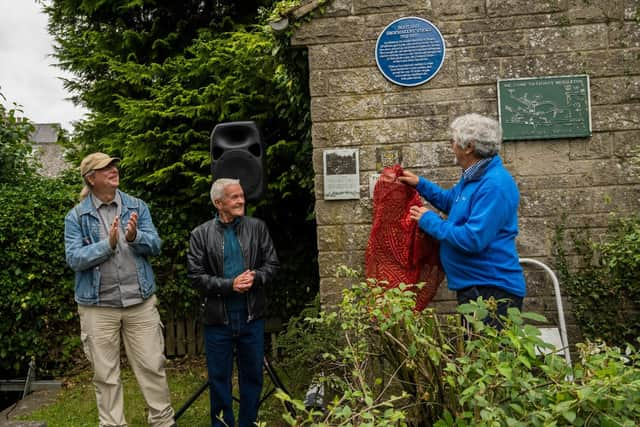Descendants of historic shoemakers' strike unveil commemorative plaque in Stoney Middleton
and live on Freeview channel 276
Village residents and visitors gathered for a ceremony in the Grove Garden on Saturday, July 24, in which the plaque was unveiled in tribute to boot and shoemakers of the village and neighbouring Eyam who took part in the famous strike of 1918-20 and established their own cooperative factory.
It is believed to be the longest strike in the footwear trade in England and one of the longest involving a group of women in any industry.
Advertisement
Advertisement
The plaque explains the motivation importance of the events, noting: “They sought the reinstatement of sacked colleagues, shorter working hours, a war bonus and recognition of their trade union, the National Union of Boot and Shoe Operatives.


“Their action inspired workers in other local industries to join unions, and paved the way for better wages and working conditions for later generations.”
The plaque was unveiled by Richard Coates, grandson of one of the strikers, Harry Dawson. Richard spoke about the poor working conditions in the factories and how his Harry was sacked after 30 years service to one of the Eyam firms, leading him to become active in the union.
Richard paid further tributes to his mother Doris Coates who wrote about growing up in Eyam and the impact of the strike in her memoirs Tunes On A Penny Whistle, whichbrought the story to a much wider audience.
Advertisement
Also in attendance was Neil Barber, whose grandfather William Nelson Barber was one of the first to join the union in 1918, striking alongside Neil’s aunts Maggie and Bertha Barber.
Advertisement
The other was John Mortimer, from Sheffield whose great- great-grandfather was the trade union leader, Will Thorne. Thorne a founding member of the Labour Party, and as an MP at the time he raised questions about the strike in Parliament. He visited Eyam in June 1918 and spoke in support of the strikers.
The ceremony featured speeches from speeches from local dignitaries, music from the period performed by Eyam musicians Andrew Couldwell and Andy Hoult, an exhibition on the strike, and display of banners from Chesterfield Trades Council and Eyam Primary School pupils.
There was also a speech from historian Cathy Hunt, who pointed out how few public memorials there are to trade unionists.
Advertisement
She said: “The unveiling of this plaque is hugely significant. I’m so pleased to see the bravery of these women and men, and the support they received, commemorated.”
James Eadon, from Chesterfield Trades Union Council, spoke about the continuing importance of trade unions today, in rural areas as well as towns and cities.
Advertisement
Financial support for the plaque came from the Stoney Middleton Parish Council, the well dressing committee and Stoney Middleton Heritage Group, as well as individual donors.
A similar plaque is to be unveiled in Eyam on Tuesday, September 14, at 2.30pm on the village green. Children from Eyam Primary School and descendants of families involved in the strike will again take part.